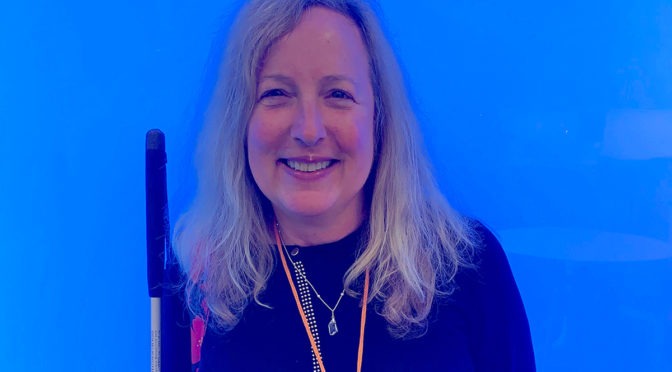When my sister and I were diagnosed with retinitis pigmentosa (RP) at early ages, there was little known about the disease. My parents were told by experts in the field that we would gradually go blind and there was no cure. My parents left the office without any support or resources.
Due to the nature of RP, I feel that I was very misunderstood by people. My symptoms of night blindness, severe near sightedness and difficulty in recognizing faces made it hard for me to make friends and participate in sports and social activities. As a result, I began at an early age to fend for myself and develop my own techniques for doing things, all with the purpose of hiding the fact that my vision was changing.
For most of my life, there were times that I felt “perfectly fine”, and that I had everything under control. I had developed quite the system to hide my blindness, and even had a few trusted friends recruited to be my so-called “bodyguards” who would look out for potential hazards for me. My system seemed to work—until the time came that it didn’t.
I was able to get a fabulous job right out of college in New York City and after nine years of secretly struggling with spreadsheets and computer screens that were becoming more and more difficult to read, I felt that I had no other choice but to leave that job. While I now know that accessible technology exists for people who are blind to succeed in their professions, I did not know that then.
The next part of my journey took me out west when my husband’s job transferred to Ohio. We started a family and motherhood became my new career. I poured myself into raising my two daughters. I immersed myself into their activities and volunteered at school, church, Girl Scouts and anything else anyone asked me to do. I had to prove to the world that I was still useful. Meanwhile, I was riddled with fear and anxiety as my vision was failing, living a double life between the sighted world and the blind world. I knew it was time to make some very significant changes.
My transformation began after attending my first National Federation of the Blind national convention where I was surrounded by thousands of blind people who were happy and living independent lives. I now had found a community of blind people who became my role models and mentors.
I came to the realization that I did not want to hide my blindness anymore. I registered with my state vocational rehabilitation agency for white cane and technology training. Because I could no longer read print, I was functionally illiterate, and I knew I needed to learn braille. After that, I served in various leadership roles in the blindness community and participated actively in legislative work to help change the lives of blind people.
My blindness skills also gave me the confidence to go back to college and get a degree in Counseling, which had become a passion of mine throughout the years. I worked as a Counseling Assistant for a treatment center and a Caseload Assistant for the Ohio Bureau of Vocational Rehabilitation.
My journey now brings me to last July when I heard LightHouse CEO Bryan Bashin passionately speaking about the mission and philosophy of LightHouse at a convention.
I was so inspired that I knew at that very moment that my life was falling into place. I just had to be a part of his team.
Through a series of very fortunate events, I now have landed my dream job as Community Outreach Coordinator for LightHouse. I now have the privilege of making connections throughout the Bay Area and spreading the word to the blind community about all the programs and services that LightHouse has to offer.
I first focused my outreach efforts on our senior population, but now with the COVID-19 pandemic upon us, the implementation of outreach has had to change. I was asked to help develop our Care Calls Program, where we call approximately 1,600 LightHouse students, who we currently serve, to find out where we may assist with any challenges they may be facing during this time of shelter in place. It is important for everyone to know that even though the doors of LightHouse are closed right now, the lines of communication are still open.
If I can prevent even one person from experiencing the grief that I went through trying to overcome the barriers that hiding my blindness had brought to my life, then my role as Community Outreach Coordinator will be complete.


Thank you for sharing your story Sheri and welcome to the LightHouse team. We are very fortunate to have a person of your talents and passion as a colleague.
Thank you so much Tony! it is because of what you do, and what LightHouse does as a whole, that gives me the passion that i have to perform my job!